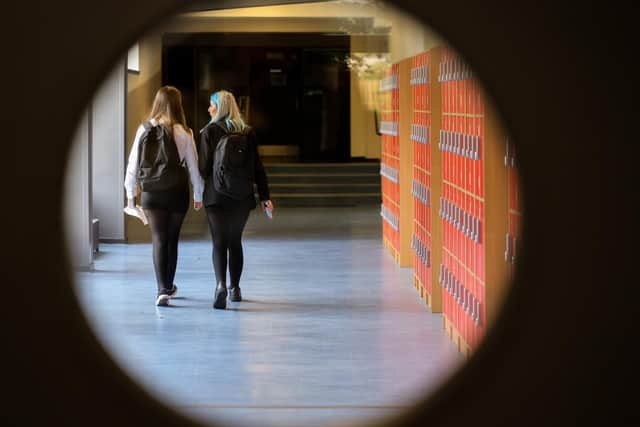'Perfect storm' set for A Level and GCSE appeals, warns Northern education leader
More than 1.2m pupils will receive their A-level and GCSE grades “on what they have been taught,” after teachers in England have helped decide after exams were cancelled for the second successive year due to Covid-19.
But Frank Norris, the education advisor for Northern Powerhouse Partnership (NPP) has questioned the fairness of the appeals system, which he said could favour pupils from more advantaged areas who know how to navigate the system and widen an attainment gap.


Advertisement
Hide AdAdvertisement
Hide AdThe NPP argues that much of the attainment gap between pupils in the North and those in London existed because there is such a high proportion of pupils with disadvantaged backgrounds.
Mr Norris said: “Bearing in mind considering what happened last year - there is a general consensus that there is real concern about the challenge to the grades that have been awarded - this happened last year.
“The level of challenge from some of the more advantaged areas appears to be significantly higher than the least advantaged areas.”
Mr Norris, who is also an independent chair of the Blackpool education improvement board, added there were real concerns for secondary pupils ahead of September with school leaders having to mitigate results against combating disruption with restrictions now lifted.


Advertisement
Hide AdAdvertisement
Hide AdIt comes as the latest government figures show more than a million students were out of school last week.
The statistics show that 14.3 per cent of children were not in class last week because of issues related to Covid-19, up from 11.2 per cent the week before.
Secondary schools were hit the hardest, with only 67.3 per cent of pupils attending class, down from 73.6 per cent on the previous week.
Mr Norris said: “In effect the uncertainty of all the exam grades at a time where there is uncertainty about what September is going to mean in terms of operational work for schools and how they are going to manage all of this.


Advertisement
Hide AdAdvertisement
Hide Ad“The school system simply isn’t set up in a way to cope with all of this. What we could have done is a lot more if there had been less uncertainty about the examination results and about the actual plans for September.
“I think we have a perfect storm emerging here based purely on uncertainty. We are in a new sort of territory for schools.”
Earlier this month, Simon Lebus, the acting chief executive of the Office of Qualifications and Examinations Regulation, known as Ofqual, insisted to The Yorkshire Post that measures are in place to mitigate inequality.
The Department for Education said Ofqual had developed a robust process that takes a wide range of evidence into account, to ensure grades are as fair as possible for all students.
Advertisement
Hide AdAdvertisement
Hide AdA spokesman for the Department for Education, said: “It would not have been fair for exams to go ahead this summer due to the disruption to pupils’ education, which is why those who know students best – their teachers – have determined their grades based on a range of evidence like mock exams, coursework, in-class tests and more.
"Students have only been assessed on what they have been taught."
A special Yorkshire Post report includes:
- Parents, headteachers, university students and leaders open up about the challenges to education over the past 18 months.
- Anne Longfield, the former Children's Commissioner for England, has called for a 10-year education plan, including the creation of a northern learning team, to be instigated to help combat a a “triple whammy” of disadvantage for thousands of children across the region and give pupils the “rightful” support to ensure they fulfil their full potential.
Advertisement
Hide AdAdvertisement
Hide Ad- Justine Greening - a former Education Secretary and the architect of the opportunity areas programme during her time in government - has made an impassioned plea to Prime Minister Boris Johnson to ensure more powers are given to local communities to create more opportunities for young people.
- Labour Shadow Education Secretary Kate Green said due to a number of Department of Education “fiascos” over the past 16 months including the exams chaos of last summer when an algorithm “cheated children of results”, a government u-turn on free school meals and “last minute”planning, Education Secretary Gavin Williamson is “not fit” to remain in post.
- The Government should prioritise digital devices and the internet amid concerns that the region will see an “huge” skills gap for the future, a Yorkshire business leader has claimed.
______________
Support The Yorkshire Post and become a subscriber today.
Your subscription will help us to continue to bring quality news to the people of Yorkshire. In return, you'll see fewer ads on site, get free access to our app and receive exclusive members-only offers. Click here to subscribe.
Comment Guidelines
National World encourages reader discussion on our stories. User feedback, insights and back-and-forth exchanges add a rich layer of context to reporting. Please review our Community Guidelines before commenting.